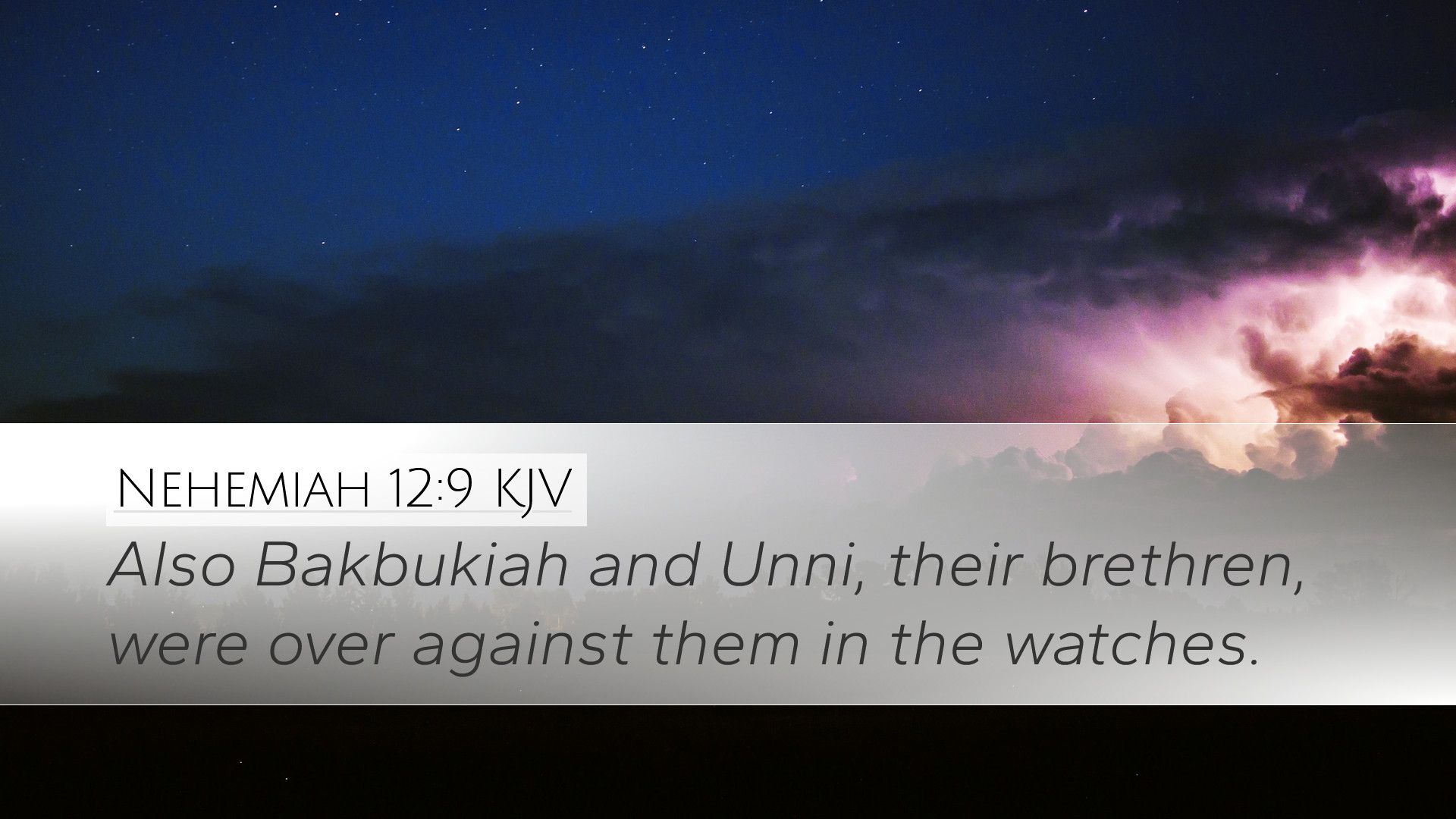Commentary on Nehemiah 12:9
Verse: Nehemiah 12:9 - "And Bakbukiah and Unni, their brethren, were over against them in the watches."
Introduction
The verse in Nehemiah 12:9 highlights the organization and roles of Levitical priests during the rebuilding period of Jerusalem after the exile. This is a crucial moment as it emphasizes the importance of order and dedication in the worship and service of God. The history of Israel is marked by these periods of rebuilding both physically and spiritually.
Contextual Overview
This passage is set within the context of the returning exile, with Nehemiah at the forefront of the efforts to restore Jerusalem. The entire chapter focuses on the rededication of the wall and the re-establishment of proper worship. The use of the term "watches" indicates a structured approach to worship, underscoring the need for vigilance and division of labor in service to God.
Insights from Public Domain Commentaries
Matthew Henry's Commentary
Matthew Henry notes that the mention of Bakbukiah and Unni signifies the importance of leadership roles among the Levites. Each name in these genealogies connects to a significant heritage and responsibility. Henry emphasizes:
- Leadership and Service: The division of labor among the Levites symbolizes the unity and multifaceted nature of worship. Every individual is essential in fulfilling God’s call within the church community.
- Ongoing Vigilance: The "watches" symbolize not only physical roles but also spiritual vigilance. Leaders must remain attentive to both the people’s needs and God’s commands.
Albert Barnes' Notes on the Bible
Albert Barnes elaborates on the practical implications of this verse for the post-exilic community. He states that the roles defined here serve to:
- Reinforce Order: Every role mentioned denotes a structured approach to worship. This order reflects divine intention and contributes to communal identity.
- Facilitate Worship: By appointing watchers, the community ensures that worship and service to God are not neglected. It is a reminder for modern believers about the diligence in serving God faithfully.
Adam Clarke's Commentary
Adam Clarke provides a detailed historical perspective on the significance of Bakbukiah and Unni. He notes that:
- Historical Importance: The names represent a lineage that contributes to a greater understanding of God’s faithfulness through generations.
- Covenantal Role: This verse serves as a reminder of the Levites’ covenant with God to serve Him through music, worship, and protection of the sacred places, thus emphasizing the continuum of God’s guidance and presence.
Theological Implications
Nehemiah 12:9 communicates profound theological themes for reflection:
- Divine Order in Worship: God values order in worship, revealing His desire for His people to approach Him reverently and intentionally.
- Community Engagement: The roles signify a call for every believer to engage in service and leadership, fostering a community committed to spiritual growth and vigilance.
Practical Applications for Today
For pastors, students, theologians, and Bible scholars, this verse serves as an indispensable resource for understanding the nature of worship and community in the life of the church today.
- Encouragement for Active Participation: Just as the Levites were given roles in the worship process, modern believers should seek to identify and fulfill their God-given roles within the church.
- Vigilance in Spiritual Leadership: Leaders are called to maintain a watchful eye over the spiritual state of the community, ensuring that worship remains focused on God.
- Reminder of Heritage: Understanding the heritage of faith as illustrated by the Levites encourages contemporary Christians to appreciate their roots and commitment to God through history.
Conclusion
Nehemiah 12:9, while presenting a clear organizational aspect of the Levitical priesthood, transcends mere administrative detail. It invites believers to contemplate the divine call to order, community, and dedication in every aspect of worship. As they reflect on the roles depicted, they are reminded of their vital place within the body of Christ and the ongoing call to serve vigilantly.


